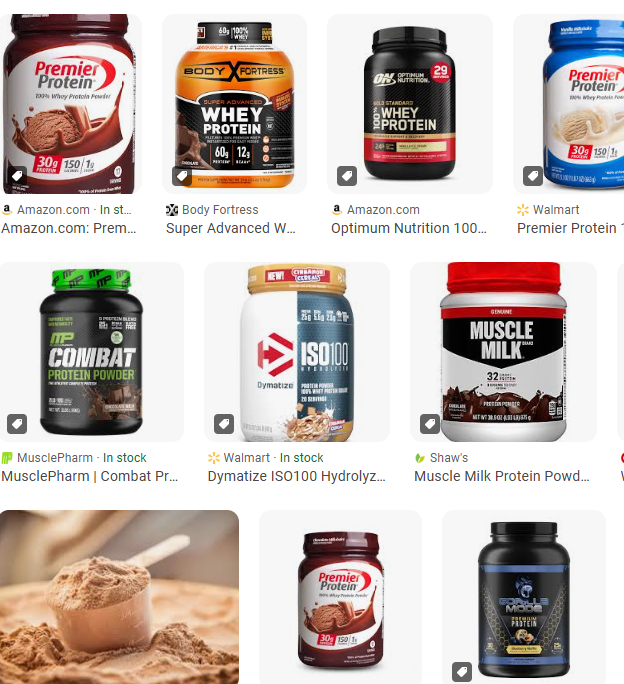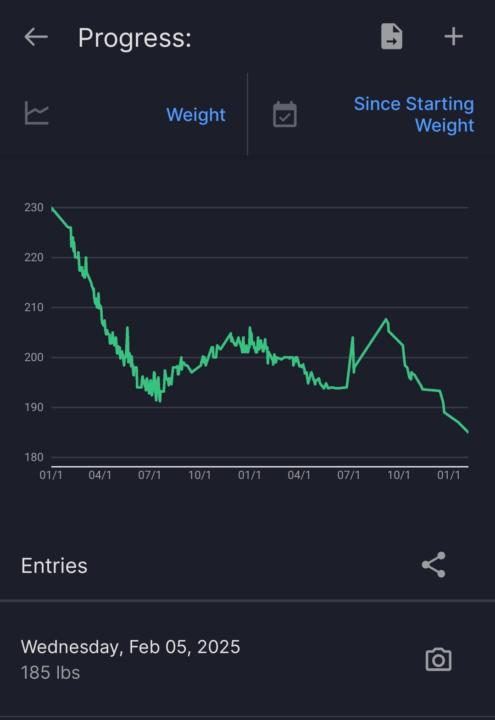
Write something
The Power of Protein: Your Secret Weapon for Fitness Success
If you're new to fitness, here's a game-changing tip: focus on your protein intake! While many beginners obsess over workout routines, they often overlook what happens in the kitchen. Your body needs adequate protein to repair and build muscle after exercise—typically 0.8-1g of protein per pound of body weight daily. Make protein the star of each meal with foods like chicken, fish, eggs, Greek yogurt, beans, or protein shakes. This simple change will fuel your recovery, reduce soreness, and help you see results faster than exercise alone. Remember: Your workouts break down muscle, but proper nutrition rebuilds it stronger. No matter your fitness goals—whether building muscle, losing fat, or improving overall health—prioritizing protein is one of the smartest moves you can make. #FitnessNutrition #BeginnerFitnessTips #ProteinMatters
1
0

How I Dropped Nearly 50 Pounds by Tackling the Biggest Fitness Obstacle: Overeating
Can I share my struggle and successes with you? I wanted to share my journey of losing nearly 50 pounds, as shown in the progress chart I’ve attached, and the key lesson I learned along the way: overeating is the biggest obstacle most people face in their fitness journey. It’s not about grueling workouts or extreme diets, it’s about understanding what’s on your plate. When I started back in 2023, I weighed 231 pounds. By focusing on eating less and tracking my macros, I’ve gotten down to 185 pounds. The chart shows the steady downward trend, and I’m proud of the consistency. Here’s how I did it—and how you can overcome the overeating trap too. The truth is, most of us overeat without even realizing it. Portion sizes have ballooned over the years, and it’s easy to consume far more calories than our bodies need. A single extra slice of pizza or a mindless snack while watching TV can add hundreds of calories to your day. Over time, those calories stack up, leading to weight gain or stalled progress. For me, the game-changer was tracking my macros—protein, carbs, and fats. By logging everything I ate, I became aware of just how much I was overeating. I used a simple app to keep tabs on my intake, aiming for a calorie deficit while ensuring I got enough protein to preserve muscle. I also made a conscious choice to eat less overall. This didn’t mean starving myself—it meant being intentional. I focused on nutrient-dense foods like lean meats, veggies, and whole grains that kept me full longer. I cut back on processed snacks and sugary drinks, which were sneaking in empty calories. Tracking macros helped me balance my meals so I wasn’t left feeling deprived, but I was still eating less than I used to. One surprising thing I did was work out less. I know that sounds counterintuitive, but hear me out. Intense workouts can ramp up your hunger, making it harder to stick to a calorie deficit. Instead of daily sweat sessions, I prioritized lifting weights at least twice a week to maintain muscle mass. This kept my metabolism humming without triggering the kind of hunger that leads to overeating. On other days, I stayed active with light walks, but I didn’t push myself to the point of ravenous hunger.
0
0

Creatine vs. Depression, Anxiety, and PTSD.
This morning was tough. I woke up to a string of messages and a phone call that shattered my heart - a comrade in arms that I had deployed to Afghanistan with, took his own life last night after battling with PTSD. It's a stark reminder of how deeply PTSD affects so many veterans and law enforcement members, including my own friends and family. Each loss feels like a personal defeat, a reminder of how critical it is to find effective ways to manage and heal from this invisible wound. As I've been delving into research on health supplements, I found that creatine could offer a glimmer of hope. Creatine supplementation, commonly known for its benefits in muscle performance, might also play a significant role in aiding the treatment of PTSD, alongside anxiety and depression. Here's what I've learned from recent studies: - Creatine and PTSD: An open-label study by Amital et al. (2006) found that creatine monohydrate might provide modest benefits in treatment-resistant PTSD cases, improving sleep, depressive symptoms, and PTSD symptomatology. - Brain Function and Creatine: Forbes et al. (2022) in their narrative review suggest that creatine could increase brain creatine content, potentially aiding cognitive function, depression, and recovery from traumatic brain injuries. Although more research is needed, there's a suggestion that creatine could be beneficial for those dealing with the aftermath of trauma. - Stress Recovery: A study on US Veterans showed that higher creatine concentrations in the anterior cingulate cortex (ACC) were associated with better recovery from traumatic stress (research paper on Creatine concentration in the ACC). This indicates that creatine might not just be a muscle supplement but also a neurochemical ally in the battle against PTSD. I share this not just for academic interest but from a place of deep personal concern. If this information can help even one person, then it's worth spreading. If you or someone you know is wrestling with PTSD, please consider the following:
When Should You Consume Protein For Muscle Development and Body Composition?
If you've ever wondered about the best time to consume protein for muscle growth and improving body composition, you're not alone. A recent study by Wirth, Hillesheim, and Brennan (2020) analyzed the effects of protein intake timing on body composition and muscle function to find out if when you eat protein really matters as much as how much you consume. Here’s what they found and what it means for you! Key Findings: 1. Total Protein Intake is Key: The study emphasized that total protein intake (ideally 1.2–1.5 g/kg of body weight per day) was more significant than timing. Whether participants consumed protein before, after, or spaced out throughout the day, the gains in lean body mass (LBM) were similar across all groups. 2. Timing Doesn’t Make a Big Difference: Protein timing, such as before or after exercise, did not significantly affect LBM improvements or strength gains. The takeaway? Consuming enough protein each day is more impactful than the exact timing of each meal. 3. Protein + Resistance Training = Best Results: The study highlighted that combining resistance training with a high-protein diet is essential for muscle development, especially for beginners who are looking to make noticeable improvements in body composition. Practical Recommendation Based on the Results of the Study: - Daily Protein Goals: Aim for 1.2–1.5 g of protein per kg of your body weight every day. You can spread this out across meals to make it easier to reach your goal. - Consistency Over Timing: Don't stress too much about consuming protein at a specific time. Instead, ensure that you consistently reach your daily intake. - Pair Protein with Workouts: Engage in regular resistance training (like weightlifting or bodyweight exercises). This will maximize the muscle-boosting benefits of your protein intake and help you build strength more effectively. The science supports a simple approach: prioritize hitting your protein target and staying consistent with your workouts. Whether you're eating protein at breakfast, lunch, or dinner, what really matters is that you're fueling your body with what it needs to grow and recover.

Low-Inflammation Foods
We’ve all been in places where our energy levels are tanking, we feel emotionally dysregulated, we can’t focus. We keep asking ourselves ‘why?’ and can’t get answers. What if I told you the answer to ‘why’ is in the food we eat? Evidence has shown that incorporating anti-Inflammatory foods can help reduce stress and anxiety, improve cognitive functioning, and enhance metabolic functioning. Try adding these foods to your diet and notice the changes in energy and focus!

1-9 of 9

skool.com/rounds-complete-fitness
Master your fitness and confidence with expert coaching, workouts, nutrition tips, and accountability—all tailored for driven leaders. Join today!
Powered by

